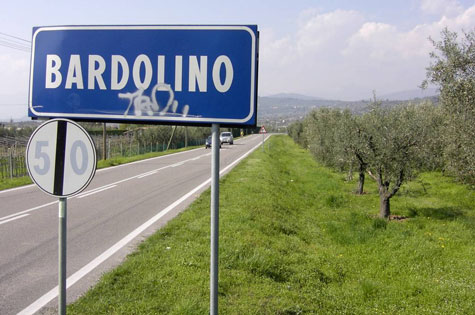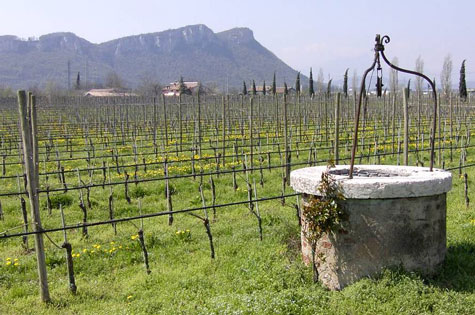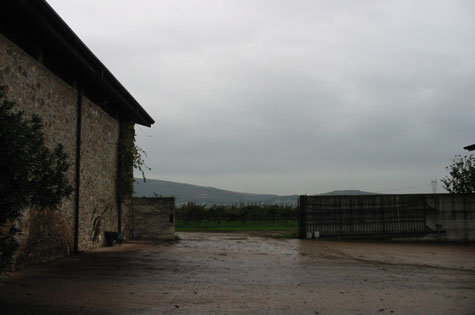| About Matilde Poggi |
 |
|
|
Matilde
Poggi is in charge of the family farm Le Fraghe, some 28 acres in
Cavaion Veronese close to the Garda lake, since 1984. Cavaion lies
in the heart of the Bardolino area, in the central "Bardolino
Classico" zone. The region, which is dominated by big cooperatives,
floods Europe each year with a sea of light red wines, in which
independent producers can not easily distinct themselves.
Some producers resort to foreign grapes such as Cabernet en Merlot
in order to boost up their wines. Others, among them Matilde Poggi,
cling to the authenticity of the Bardolino and choose for a qualitative
approach. Since the eighties the vines of Le Fraghe have been replanted
with a greater density, while yields were reduced drastically (they
now average 60 hectolitres pro acre). The Corvina and Rondinella
vines have been replanted on different plots, as the Rondinella,
having a thicker skin and thus contributing more to the modest tannins
of the Bardolino, ripens later than the Corvina. The inferior Molinara
was eliminated altogether. Experiments with the Chardonnay were
halted despite their commercial success. For a moment it seemed
that even the Chiaretto was to become a victim of this firmness,
but eventually (and luckily) this was not the case.
The wines of Le Fraghe always get good scores in the Italian wine
guides.
|
|
 |
|
 |
|
| The wines of Azienda Agricola Le Fraghe |
|
| Camporengo |
|
In
the Western Veneto the Trebbiano Toscano, the Tocai and the Garganega
are the traditional white varieties. The sole white wine of Le Fraghe
is a "monocépage" of Garganega. A very rich aroma,
with impressions of apricots and chicory. Flavour of ripe peaches
and, again, chicory. A full-bodied white wine that can best be drunk
with a light meal.
|
|
| Bardolino Chiaretto |
|
The Chiaretto is made with the same varieties as the Bardolino,
being Corvina and Rondinella, but vinified according to the "rosé"
procedure, meaning: fermented during a very short period. The resulting
wine is extremely fresh and at the same time particularly aromatic
and fruity. The recent 2002 vintage not surprisingly won an Italian
prize for its "bevebilità". To be drunk during
spring and summer. |
|
| Bardolino |
|
As
one of the quality pioneers of the appelation, Matilde Poggi aims
at restoring the Bardolino in its authenticity and intends to get
rid of the cheap, touristical image of the wine. The 2004 vintage,
assembled from Corvina and Rondinella, has a strikingly dark colour
for a Bardolino. The aroma is floral and fruitful, a bit leathery,
the flavour is quadrupled fruit (water melon, raspberries) and nicely
"corsé". No muscle rolling here, this is pure Italian
sophistication. |
|
| Quaiare |
|
In
the "Bardolino" appelation many a wine maker is experimenting
enthousiastically with red varieties other than the traditional
Corvina, Rondinella or Molinara. Since 2001 a "Bardolino Superiore"
may legally contain up to 20% Cabernet Sauvignon or Merlot. Some
producers make use of this possibility to create darker and more
structured Bardolino wines. As Matilde Poggi clings to the authenticity
of her Bardolino, she decided to make a separate cuvée with
the Cabernets. Vintage 2000 is by all means a ripe, concentrated
and classy wine (70% Cabernet Sauvignon, 30% Cabernet Franc). Not
a trace of the "green" tannins often encountered in Northern
Italy. The typical, penetrating black cherry aroma of the Cabernet
Sauvignon, spiced with juniper, roasted chicory, grinded coffee,
clove, pine needles... While waltzing lots of cassis comes up. Flavour
of (again) cassis and black cherries, cocoa and clove. An unbelievably
rich wine, nevertheless requiring oxygen and time to be fully appreciated. |
|
|